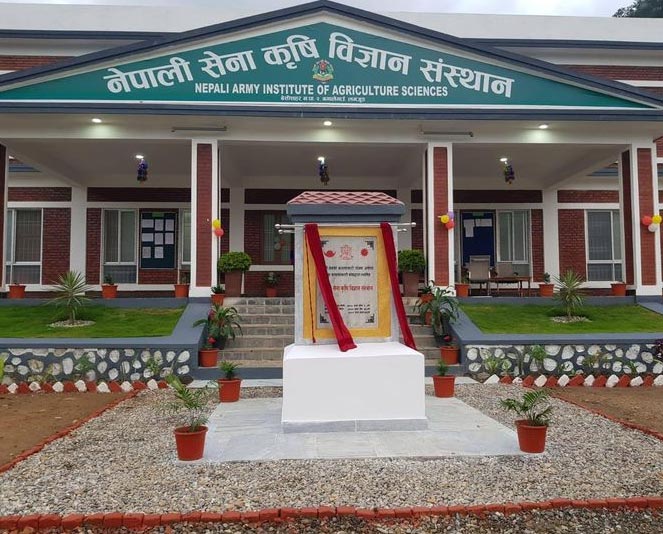Overview
Pre-Diploma in Agriculture (Plant Science) at the Nepali Army Institute of Agricultural Sciences
The Nepali Army Institute of Agricultural Sciences (NAIAS), located in Besisahar, Lamjung, offers a pre-diploma in agriculture (plant science) program affiliated with the Council for Technical Education and Vocational Training (CTEVT). This program introduces students to practical and scientific aspects of plant science, equipping them for employment or further study in agriculture. The course provides foundational knowledge in crop production, soil management, and horticulture, along with practical skills needed in the field.
NAIAS integrates academic learning with hands-on training using its extensive facilities, including crop fields, vegetable farms, and orchards. The institute serves both children of army personnel and students from civilian backgrounds, aiming to strengthen Nepal's agricultural workforce.

Curriculum Details
The curriculum is structured over 18 months, blending theoretical instruction with field practice. Key subjects include:
-
Fundamentals of Plant Science
-
Soil and Fertility Management
-
Crop Production Techniques
-
Vegetable and Fruit Cultivation
-
Pest and Disease Management
-
Nursery and Greenhouse Management
-
Irrigation and Weed Control
-
Farm Tools and Equipment Handling
-
Agricultural Extension and Communication
-
Entrepreneurship Development
-
On-the-Job Training (OJT)
The program ensures that students gain both academic knowledge and field-based learning through project work and local farm exposure.
Objectives
-
To develop practical skills in plant production and care
-
To promote sustainable and commercial farming techniques
-
To prepare competent junior technicians for agricultural employment
-
To support national goals related to food security and self-reliance
Scope
Graduates from this program can pursue:
-
Entry-level positions in agricultural farms and cooperatives
-
Work in agro-based industries and nurseries
-
Support roles in governmental and non-governmental organizations
-
Self-employment in vegetable, fruit, or cash crop farming
The course is also a stepping stone to a diploma and bachelor-level agricultural studies.
Learning Outcomes
By the end of this course, students will be able to:
-
Identify and cultivate major crops suited to various climatic zones
-
Apply correct techniques in soil preparation and pest management
-
Use irrigation and fertilization methods efficiently
-
Perform field operations such as planting, weeding, and harvesting
-
Maintain nurseries and manage greenhouses
-
Communicate agricultural practices to local farmers
Skill Development Modules
The course includes several practice-based modules to enhance student skills, such as:
-
Crop calendar planning
-
Organic and chemical fertilizer use
-
Plant protection measures
-
Safe use of hand tools and machinery
-
Greenhouse farming basics
-
Record keeping and farm budgeting
Modules are updated as per CTEVT standards and local agricultural demands.
Teaching Methodology
NAIAS uses an integrated approach combining classroom teaching and field instruction:
-
Interactive lectures
-
Practical demonstrations in the institute farms
-
Group activities and local surveys
-
Problem-based learning assignments
-
Guest sessions by agricultural officers
-
On-the-Job Training (OJT) in the final semester
This balanced format ensures students gain job-ready skills.
Admission Requirements
Applicants must:
-
Have passed Grade 10 (SEE or equivalent)
-
Meet minimum GPA criteria as set by CTEVT
-
Pass the entrance exam conducted by the institute or CTEVT
Seats are limited, and applicants with military family backgrounds may receive priority, although all eligible candidates are welcome to apply.
Career Opportunities
Graduates can begin working in:
-
Private and public farms
-
Agro-supply stores and cooperatives
-
Agricultural extension programs
-
Horticultural centers and nurseries
They may also start their own small-scale farms, focusing on local crop production and vegetable farming.
Scholarships and Financial Aid
NAIAS offers limited scholarships based on academic performance, financial need, and service background. Students may also explore:
-
Local government scholarships
-
CTEVT support schemes
-
Nonprofit or NGO-based agricultural education grants
Why Choose This Course?
This program provides early access to professional agricultural education in a structured and supportive environment. Students benefit from:
-
Field-based training under experienced instructors
-
Learning facilities, including real farms and greenhouses
-
Direct application of lessons to real-world agricultural work
With Nepal’s increasing demand for skilled technicians in agriculture, this course builds both competency and confidence among learners.
Conclusion
The Pre-Diploma in Agriculture (Plant Science) at the Nepali Army Institute of Agricultural Sciences equips students with practical skills, applied knowledge, and real-world experience. It supports both career readiness and long-term contribution to Nepal’s agricultural progress.













